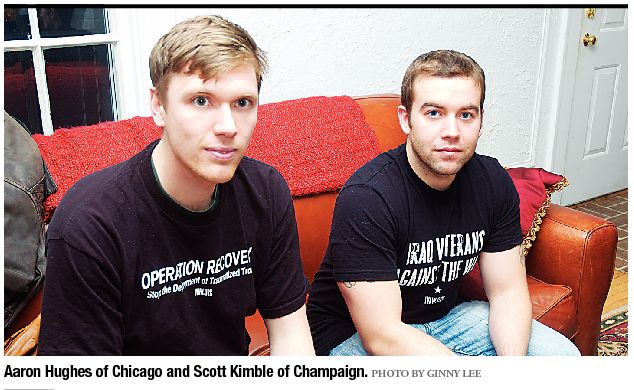
Iraq vets urge end to multiple deployments
MILITARY | Ginny Lee
Some 70 folks gathered at the home of Meg Evans and Peter Lazare in Springfield Sunday, Dec. 19, to hear members of Iraq Veterans Against the War speak, as well as enjoy music by local musicians. Participants read poems written by Iraq and Afghan War vets as well.
Sarah Lazare, 27, who organized the event at her parents’ home, is not a vet, but is actively supporting the IVAW through the group Courage to Resist, of Oakland, Calif.
“The war in Afghanistan is entering its 10th year,” Lazare said. “Some troops are in their fourth, fifth and sixth deployments. We think it’s important to recognize that that is not normal or acceptable.
“We hope that by ending this cruel and inhumane practice (of multiple redeployments), we can help end the wars,” Lazare said.
Iraq War veterans Aaron Hughes of Chicago, Scott Kimble of Champaign, and Brock McIntosh of Normal spoke about Operation Recovery, which opposes sending troops with PTSD, Traumatic Brain Injury, and Military Sexual Trauma back into battle. Operation Recovery insists that traumatized veterans have the right to heal.
“I think it’s morally abhorrent to send mentally traumatized soldiers back to battle where they use heavy weapons and armor,” McIntosh said. “Many of these soldiers are on psychotropic drugs and are a danger to themselves, to fellow soldiers and everyone else.”
As a member of the Illinois National Guard, Aaron Hughes was called up to serve in Iraq when he was a 20-year-old industrial design student at the University of Illinois. “I wanted to get rid of Saddam Hussein,” he said. By the end of his tour in 2004 he was frustrated with the war effort. He re-enrolled at the U of I as a painting major. As he made his paintings, he realized he had something to say about the Iraq War.
Now 28, Hughes travels the country as an organizer urging veterans to stand up for their rights. “As veterans and U.S. citizens, we have human rights,” he said. “There is a Department of Defense regulation that says we should not redeploy vets with trauma.”
Twenty percent of troops deployed repeatedly have PTSD, Hughes said. Suicide rates among active-duty troops are twice as high as that of the civilian population, and veterans with PTSD are six times more likely to attempt suicide, according to the IVAW.
Hughes said that Military Sexual Trauma is a major problem for female soldiers, one third of them suffering sexual assault. Ninety percent of women soldiers seeking help from the Veterans Administration report sexual assault from fellow soldiers, he said.
“Women have to go to their commander to prove their case first,” Hughes explained, and often their complaints are dismissed. “Women are expected to return and serve with the same soldiers who assaulted them,” he said. The actual number of cases of MST is difficult to verify, as many sexual assaults go unreported. According to a 2004 study cited by the Service Women’s Action Network, 71 percent of women veterans seeking help from the VA had been sexually assaulted.
Scott Kimble served in the army in Iraq.
When he got out of the military in 2007, he just wanted to get on with his life. “Then I started feeling a moral weight on me as a veteran to speak out,” he said. “ Many veterans are proud of their service in Iraq and Afghanistan, Kimble said. “One of the great things about Operation Recovery is that we’re supporting veterans whether they’re pro-war or not.
“Plenty of veterans come home and can barely function in society, and the military casts them off,” Kimble said. “We want to hold the military accountable.”
IVAW now has 2,000 members nationally and is working for the immediate withdrawal of U.S. troops from Iraq and Afghanistan.
The book of poems, Warrior Writers: Remaking Sense, can be ordered through the IVAW website, www.ivaw.org, for $20. Civilians wanting to get involved can learn how at www.civsol.org.
Contact Ginny Lee at [email protected].